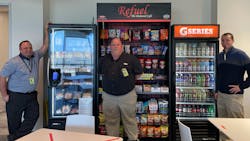Corpus Christi, Texas-based Oneta Co., a women-owned business, has been in the beverage business for almost 150 years. It had owned the last independent Pepsi bottling plant in Texas, shuttering that operation in 2010 as part of PepsiCo’s “transformative bottling acquisitions.”
Today, Oneta’s offerings include soft drink distribution, bottled water, office coffee service, vending machines and self-checkout micro markets. Micro markets are the fastest-growing service offering for this venerable company’s two vending divisions, Sunrise Canteen Vending, based in Corpus Christi, and Victoria Canteen.
The Victoria, TX-based division, managed by Hersey Williams, has found success by tailoring its markets to the specific needs of individual clients. The operation uses several technologies from 365 Retail Markets to deploy the right solutions for large and small locations in private workplaces or public spaces.
“We’re using 365 Retail Markets exclusively,” Williams said. “Anything they put out is cutting edge.”
The Victoria operation runs some 30 micro markets, a relatively new category in its service lineup, compared with 70 markets managed by its sister company Sunrise. Both branches are expected to experience significant growth this year.
“We stay on top of the latest technology and anticipate opening many more markets this year,” Williams said. “Last year would have been a record growth year … we were already up 10% in February, but COVID-19 sent us into a nosedive.”
That plunge was temporary, however. Victoria Canteen’s business began to recover by late June as demand for micro markets started to rise. Micro markets became safe food and beverage sanctuaries for businesses like chemical plants, machine shops, food processors and breweries, as well as hospitals and healthcare facilities.
For its larger locations, Victoria operates 365’s Gen3c Kiosks. “For many locations, it’s important to accept both cash and cashless payment types,” Williams said.
The Gen3c can be configured to validate both cash (with an expansion unit) and cashless payments, or be completely cashless; it gives change and can print receipts. The Gen3 model, on the other hand, is designed for locations that prefer cashless only; payments can be with an end-to-end encrypted card reader, a fingerprint reader or the 365Pay app.
Williams observed significant sales improvements when upgrading smaller markets with a full-service kiosk. “Full kiosk service with both cash and cashless payments can potentially boost sales by $500 a day over NanoMarket,” Williams said.
For smaller locations, Victoria Canteen employs 365’s tablet-based NanoMarket system. It’s equipped with a 2D barcode scanner and is designed to work with 365Pay. It can work wirelessly or connect to a data line. Victoria Canteen sets up its NanoMarkets™ for card payments only.
Available for three years now, the 365Beacon, a cutting-edge mobile market solution, is also put to work in the Victoria operation. The little “plug-and-pay” Bluetooth device has enabled the vendor to add dry goods, cold drinks and fresh food options to its office coffee venues. Customers need only to set up an account in the 365Pay app to make purchases in a Beacon-enabled venue.
“This has allowed us to expand product offerings in smaller, coffee-only accounts,” explained Williams, who will be marketing a coffee/market hybrid program to schools for their faculty rooms and offices. “In addition to food and drinks, we’ll be able to sell school supplies.”
What excites Williams most are the new merchandising opportunities made possible by 365’s PicoCooler. Introduced a year ago, the PicoCooler provides access-controlled fresh, cold options while offering self-service security.
Williams envisions the PicoCooler opening up the micro market concept to public locations, beyond traditional industrial and office locations. Victoria Canteen is installing its PicoCooler in a high-traffic public area at a hospital. The cooler will be stocked with fresh foods like sandwiches, wraps and salads, along with grab-heat-go items like tacos, burgers and meal platters.
“The fresh-food cooler will complement the hospital’s manual cafeteria that is not open 24 hours,” Williams said. “It will be part of a traditional vending installation but offer a new way for customers to buy food.”
The PicoCooler will remain locked and only opens when a patron makes a payment. Behind the cooler door, Victoria’s fresh food items will be secured and properly refrigerated, reducing spoilage and revenue loss.
Williams sees the PicoCooler as a game-changer for operators.
The PicoCooler is a not a cooler itself, but rather a compact device that’s installed on a cooler’s door, thus transforming the refrigerated case into a smart commercial appliance. It features a compact screen that displays transaction messages, along with optional promotional content. A PicoCooler device can also process payments for adjacent goods outside of it; customers simply scan and pay for a product at the cooler. It’s equipped with a camera, too.
The PicoCooler is the controlled-access cooler application for 365’s PicoPlatform, which also includes the PicoVend and [NEW!] PicoVend Mini – the platform's vending functionality and new wave of 365 vending technologies that easily attach to traditional vending machines and provide various payment options such as the 365Pay app and support 4G connectivity.
365 is excited about other innovative applications coming soon. The expanding 365 PicoPlatform will not only provide operators with more revenue opportunities, but it will also offer today's client’s the safe self-service conveniences they demand.
“The COVID-19 pandemic really revealed how capable micro markets can be,” Williams observed. “As cafeteria sites were shuttered, growth in the market sector exploded.”
